#Scrooge's awful victorian childhood
Explore tagged Tumblr posts
Text
An Album of Christmas Carols - 1
Growing up it was a household tradition to watch at least four or five adaptations of Charles Dicken's A Christmas Carol each December (with a bonus round in June). As a result, I know both the book and many of the film adaptations pretty much by heart.
So at this festive time of year, I would like to educate you, dear reader, on the many different adaptations of this literary work out there and why they're all equally awful/brilliant. Over this week I'll do posts on a few of my favourite ones, comparing their differences and basically just gushing about things I enjoyed in my childhood.
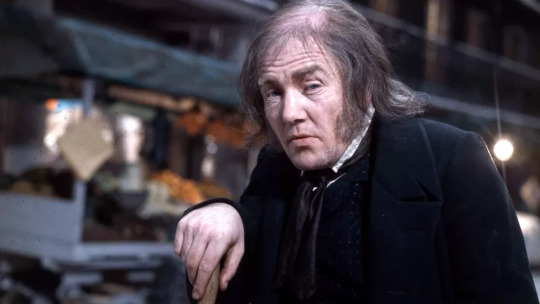
"Scrooge" (1970, Albert Finney)
This musical adaption of A Christmas Carol was one of the household favourites and featured such heart-warming songs as "I Hate People" and "Thank You Very Much (For Dying)", the latter of which is accompanied by a freed debtor tap-dancing on Scrooge's coffin as it's carted away, prompting a parade through Camden Town.
Ghosts? Ghosts!
The best part of any film adaptation of this book is how they handle the ghosts. This one comes tearing out of the gate with no less than Alec Guinness (you know, Obi-Wan Kenobi) as Jacob Marley, who not only steals the first act but gets an amazing encore during the (entirely original) scene at the end of the film where Scrooge straight up goes to Hell.
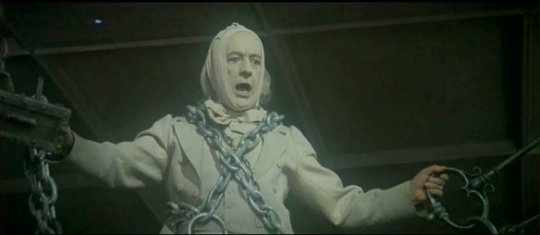
The filmmakers decide to just skip trying with Christmas Past (who, if you aren't aware, is described in the book as looking like an androgynous, age-defying being too brilliant to look at directly and very much on fire). This film went with... Female Scrooge.
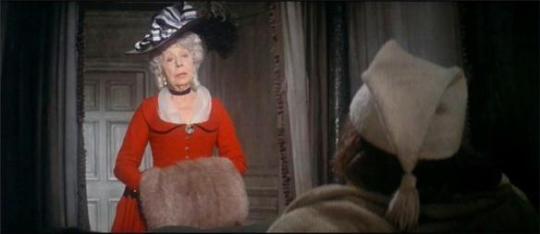
And don't get me wrong, she's great. She's sassy, sarcastic and takes none of Scrooge's bullshit, like any ghost should. Her section of the film takes up between a third and half the runtime, though we do get Fezziwig eating the scenery for a good chunk of it.

Christmas Present is up there as one of my favourite takes on the character. He's jolly but has an edge of deadly seriousness behind him, and an indisputable authority - so much so that he peer-pressures Scrooge into getting drunk in the first five minutes. Like his book counterpart, he delivers blistering retorts to the old miser and talks down to him in the way I imagine a very long-suffering parent does to a child.
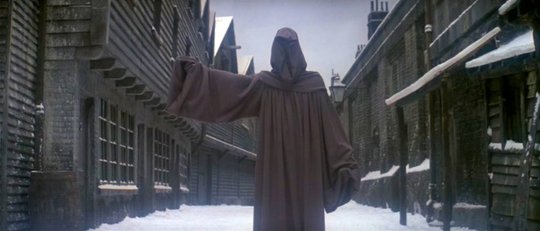
It's difficult to get Christmas Yet To Come wrong, but yet somehow I still feel this film managed it. Yes, sure, it's a spooky and mysterious dude in a robe, woOoO, but it's just so... drab. They do (spoiler) briefly reveal themselves to be a skelling-ton towards the end of their haunting so there's that.
Highlights & Humbugs
The songs are actually a lot of fun, and Albert Finney does a very good job as Scrooge, particularly in contrast to a very cheery, clearly laudanum-fuelled Bob Cratchit. Marley's haunting is spot-on, even including the ghostly hearse that drives through Scrooge's hallway, often left out. Past, Present and Future all do their jobs ably, and the section where, again, Scrooge goes to Hell is so good I feel like Dickens should retroactively add it to the book. Maybe we can slip a quill and some paper into his coffin.
And, as I noted above, you've got people tap-dancing on Scrooge's coffin. It's great.
My main gripe about it is actually Scrooge himself: Albert Finney's portrayal really ramped up the 'shabby Scrooge' look to emphasise his miserly attitude, which I always feel is at odds with how a successful Victorian businessman would dress, no matter how much he wanted to save money.
Some of the songs do go on a bit too long, such as Tiny Tim's award-bait warbling that forces you to look upon this buck-toothed angel for what feels like an eternity:
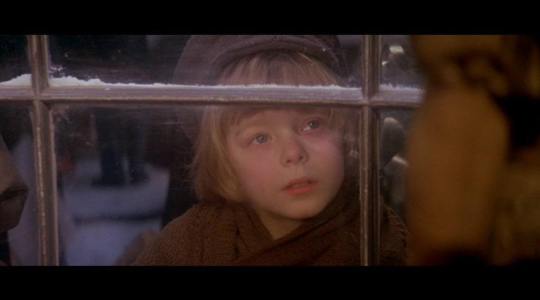
Unfortunately he survives.
All in all, I give this version of the Christmas classic 7 Humbugs out of 10. It's a solid entry and still worth watching, but have the mince pies and sherry handy for when it drags on a bit.
#deafmangoes#ebenezer scrooge#a christmas carol#christmas carol#scrooge#scrooge (1970)#jacob marley#dickens december
9 notes
·
View notes
Text
Hold your violet tiara high 1/5
Or, there is a time-honored tradition were people firmly believe that their generation was the first one to invent sex, and nobody wants to be the person to explain to Scrooge McDuck what gay people are.
Or, the one where Webby gets a girlfriend and makes life much more difficult for herself than it needs to be.
Look, look! I have actually salvaged from my documents something that might even resemble an actual fic.
For the purposes of this fic, we will assume that Scrooge really is all 150 years old, and that he has a fountain of youth tucked in there somewhere in the manor. The fic will switch between modern day, and flashbacks to Scrooge’s youth.
It could be said that it all starts when Webby and the triplets manage to convince Uncle Donald to take them with him to a Ducks N´ Roses concert, and where Webby manages to bumb into a girl of her age, with hair as red as fire, and who instantly grabs Webby’s hands, and pulls her into the crowd. “Dance with me!” She yells, and Webby complies, and then they are friends.
It could also start when They all find out that Gosalyn is actually a daughter of a friend of Launchpad, and that practically makes them all friends already, right? So, they end up keeping in touch quite a lot.
Or maybe, it starts in Gosalyn’s comfy living room, on a weekend that the children have all for themselves, Gosalyn’s father being both very progressive and more importantly absent. His progressiveness has allowed the children to spend the Saturday in the house all by themselves, Webby, Gosalyn’s friend Honker, and the triplets, without anyone exchanging knowing glances, and murmurs of “I didn’t think that boys and girls had slumber parties together at your age.” The absence of adults is still the more crucial part that allows the five thirteen-year-olds to kick back and enjoy the house.
It happens when they are singing karaoke, all stuffed with candy and lemonade (They are good kids, and more importantly they don’t need to thrill-seek on weekends. They get plenty of excitement just living with their uncle.) Gosalyn is working on a truly unique interpretation of Madonna’s Vogue, and Webby realises that she is the most radiant and beautiful being in the entire world, and that all she wants to do is let her small and insecure hands settle on Gosalyn’s swaying hips and slowly sway with her.
Oh no. Webby thinks, and takes another sip from her green and sizzling soda. How did I let this thing sneak up on me? She also thinks. She probably doesn’t even think of me as anything more than a friend.
Then Gosalyn turns around, gives Webby a smile, and all thoughts flee from Webby’s head.
That’s where it starts, but for Webby’s eternal surprise, that is not where it all ends. Gosalyn is a social, confident, popular and smart. She is involved in things like after-school programs, is a fledgling political activist, (Saint. Canard is a crappy city, and maybe we would have less crime if someone did something to make it less crappy!) and has had no problems accepting her queer identity. (Webby on the other hand finds the word queer identity intimidating, like it is too official, like after all her hard work she is still cut away from the normal teenagers, still doesn’t fit in.)
Gosalyn has not been raised in isolation for her formative years, and is good with people. She kicks ass at sports, and is in every way too good for Webby, expect that Gosalyn gets angry when Webby says this, and lists of all the qualities that Webby presumptively has, even if Webby doesn’t recognise herself in Gosalyn’s description of herself.
But it’s fine. They fit together in the way innocent teenagers do, and embrace dating with the enthusiasm of people experiencing their first love. They hold hands, and when they are feeling especially naughty, they snuggle together on Gosalyn’s sofa and exchange slow and hesitant kisses.
The triplets tell them that they are positively disgusting, and that being in the same room with them could give anyone cavities. Despite this, Huey has also quite probably already planned their wedding, even if he admits to nothing. (but it is good to be prepared. Just in case. Don’t look at my notebook!)
All in all, the panic settles in Webby only when she is walking towards her home, hand in hand with Gosalyn, who is visiting Duckburg, and then realises that she can’t invite her in.
Despite how many times she has been told to call the manor her home, that she belongs there, that she is part of the family now, she still knows that this is not her home. This is Scrooge’s home, and in the end, he has the power to sweep Webby and granny out if he is so inclined. Webby has never before even though that Scrooge would do anything like that, but the thought now slithers in, unwanted and poisonous.
She says goodbye to Gosalyn in the city, and walks the rest of the way to the manor alone. She can’t help it. She has heard of so many parents, who have talked so many times about how they would never forsake their children because of their sexuality, that it has been made painfully clear that there are many others who would. And never be it for her to think of anything bad about Scrooge McDuck, but she doesn’t know.
Webby is not part of the family, not really. And uncle Scrooge (the word uncle suddenly sounds hesitant even inside her own thoughts) is pretty old fashioned, in his own way. He was born during the Victorian era after all, and made his fortune on the times of good old America. When men were men, and women were presumably also somewhere, and when everything was simpler and cleaner. It is the part of the McDuck legend that everyone will agree to respect and slightly envy. The current McDuck is free for the paparazzi and tabloids to scavenge, but the Scrooge McDuck of the nineteenth century is untouchable.
Webby understands. Reading the exploits of the nineteenth century Scrooge has been her favourite past time for years, and while she lives with the modern-day Scrooge, she still sometimes has problems seeing the two as the same person.
As she shuffles into the kitchen, she feels weird. Like a new Webby, who has slithered inside the skin of the old one and is now an imposter in her own home.
The newspaper that she had not read in the morning is still on the table, so she skims through it, noting that some brave armchair historian has once again decided to publish an unofficial biography of uncle Scrooge. It happened from time to time, and because there was no official one, they all rewrote uncle Scrooge’s past with a slightly different pen, while agreeing to keep the main framework the same. Glasgow-America-Klondike-Duckburg, and the rest of the world tucked here and there between.
Webby can already predict that uncle Scrooge will be irritated about the whole business, he has a notorious reputation on disapproving of books written about him.
He loves telling stories of his life, and hates it when somebody tells stories of his life to him. Webby kind of understands. Having someone look at you, and then telling you who you are, must be an irritating experience.
But none of this helps Webby at all, who feels even more anxious. She decides to retreat to her room, instead of staying to hang around. She doesn’t trust herself with already irritated uncle Scrooge right now.
Dragging her feet upstairs, she sees the triplets in the living room, playing video games. Webby watches them, and for the first time in years, she feels like she is not part of the gang. It’s stupid, she knows. The boys know about her and Gosalyn, but now that the snake of insecurity has been left out of the bag, it is wreaking full time havoc in her mind.
“Hey guys!”
“Hey Webby! How was your date?”
“Yeah….about that.” She fiddles with her skirt.
Huey abandons his game immediately, and leans over the sofa. “Did something go wrong?! Are you breaking up!!?”
“No, I…Nothing like that. It’s just, have you talked to anyone. About me and Gosalyn, I mean.?”
“Um…No.” Dewey says, and also leans over the sofa, eyes curious. “Why?”
“Well, it’s just that…can you maybe not? I don’t think I want anyone to know.”
Even Louie has now abandoned the game, and is looking at Webby over the sofa. Together the three of them fix their identical stares at her.
“Why not? Wouldn’t it be easier if everyone knew?”
“I mean…” Webby starts, and finds it difficult to put her feelings into words. “I just don’t want to make it into a such a big deal. I mean, she’s my first girlfriend, how long do you think it will last?” she laughs awkwardly, the words slightly painful, now that she thinks about the implications of them.
“I don’t know, you two fit pretty well together.” Dewey says hesitantly.
“Yeah, but… I’m thirteen, and…”
“You’ll be fourteen in a month.” Huey points out.
“Still. I just don’t want the adults to know that I’m dating anyone. Okay?”
Dating is something that grown-ups do, something that will fling her into new unfamiliar world, and that goes doubly for...for lesbians. lesbians, who are always beautiful, and adults, and a bit dangerous. Lesbians don’t fall asleep curled against Scrooge McDuck on the sofa, listening to his stories. Lesbians don’t play around with Launchpad, and they don’t get piggy-back rides from uncle Donald.
Webby doesn’t want to give all that up. Not yet. Not even for Gosalyn. She isn’t ready to shed her skin that completely.
“Whatever you say.” Louie shrugs, and that seems to be the general consensus between the triplets in the end. Webby feels suddenly like she is not part of the nephew gang anymore, and feels again the seed of insecurity growing inside her. She excuses herself and escapes to her room.
Glasgow, 1878
“Hey Scrooge! Polished lots of fancy boots today?!” The caller was an eleven-year-old dog-girl with thick brown hair and clever blue eyes.
“Hey Fanny! You know it!” Answered the also currently eleven-year-old millionaire-to-be
The two grubby children settled to sit on the steps of the already closed pawn shop, shooing a great big rat to return back to its shadowy home underneath the house’s structures. Pests fighting for space in the setting sun.
The pawn shop was a popular spot for the two children to meet at the end of the day, as it represented the magical in-between place on the edges of both west- and east-ends of Glasgow. Sitting under the sign of the shop, you could easily see the beautiful church, and the beautiful houses that spread over west end, holding in them the beautiful people and their beautiful dreams. This close, you could also partake in the beautiful dreams, if maybe not anything else.
“So, how’s the business?” Fanny asked, leaning back and letting her feet settle on top of her overturned cart. During the summer days, she sold flowers on the streets, and on winter she changed her wares to matches. Ribbons she sold all through the year.
“Not bad.” Scrooge let his own short legs rest on his shoe shiners box. “I have been thinking of starting to sell firewood when winter comes. If I have money for a cart of course.” The cold wind picked up and made the young boy shiver underneath his sweater. He had been sweating heavily during the day, and now the exhaustion was starting to pick up after the fourteen-hour work day. “Not everybody cares about the state of their boots, but everybody wants to stay warm.” He added.
“That’ true.” Fanny agreed. She lifted her arm and the knitted shawl with it. It was the fanciest piece of clothing that she owned, and made her look less like a slum dweller and more like someone the customers would be willing to approach. Scrooge gladly scooted underneath the arm and the corner of the woollen shawl.
The two children watched in silence as the steady stream of carriages started their migration from west to eastwards, as they always did after sunset. A horde of bored lordlings, and other gentlemen of all ages, invaded the music halls, pubs, and other even seedier places, that were so easy to find on the east side of the city.
An open carriage full of young men, from the university, rumbled past the pawn shop steps, the carriage-floor full of wine bottles clinking with every turn of the wheels. With the hollering boys sat four much more ragged girls, laughing just as loudly, but much less authentically. Seeing Fanny and Scrooge, the petite brunette sitting on one of the boy’s laps graced them with a real smile and a quick wave.
Scrooge and Fanny waved back. [i]
“Maggie looks better.” Scrooge observed, remembering how sick his neighbour had been just last week. His mother had already been fearing for the worst, shaking her head and looking more resigned every time she went to take a bowl of soup to the ill girl, living in the much smaller apartment next door.
“She’s tougher than she looks.” Fanny said. “We all thought that it was going to be her death this time for sure.”
“papa says that it was probably something in the water. There has been something going around again in the neighbourhood.” Scrooge shuffled a little, letting his friend rest her head against his shoulder. Fanny lived close to his family, but not that close. Truth to be told, Scrooge’s family home was possibly luxurious compared to the hovel that Fanny and her sister and her sister’s Friend, (Friend capitalized.) lived in, and their water seemed to always be a bit unreliable. But Fanny was also tough, and you would never catch her complaining about anything.
“aye, I know, for us too. We try not to drink the water at all right now.” She shrugged, used to the problem. They all were used to most of the problems in east end.
“Speaking of.” Fanny hopped off the steps for a second and fished a bottle from the pouch nailed to the side of her cart. Hopping back, she settled back besides Scrooge. “Want some big sister’s home brewed?” She wrinkled her nose, sniffing from the neck of the bottle. “ugh. I miss water more and more every day.”
“Me too.” Scrooge agreed. “I bet west-end pipes never get polluted like ours do.” He accepted the bottle from Fanny and sipped at the beer inside.[ii] It was not the strong kind that Fanny’s sister sold to the factory workers from her window, but the milder kind that wouldn’t get you more than tipsy, even if you drank a barrel. The taste was familiar to Scrooge, whose family diligently bought the overpriced milk in instances of the water going more foul than usual, and then gave that milk to Hortensia, who was the youngest. Downy was not particularly happy about it, but she had to be realistic about what they could and couldn’t afford. Still, Scrooge’s mother kept a strict policy of no laudanum[iii], no mercury, and gin only if you had a bad cough. She fussed about her children like that.
“hmmh. What are you going to do when you are rich?” Fanny asked. This was a game they both loved play in these companionable moments watching the west-end carriages together. Using the word when, instead of if. Pretending that moving from one social class to another was something which was not only easy and possible, but also acceptable. Like the entire society would not hate you, if you broke the greatest taboo of all, rejecting the class you were born into.
“I’m going to save our ancestral home.”
“Oh yes. I forgot.” Fanny laughed cheerfully. “You’re a little lord in disguise.”
“oh, shut it!” Scrooge shoved his friend. “I’m never gonna be like them!” A carriage again rolled past, carrying with it an older gentleman, who looked at the two children sitting on the steps, and then spat on their general direction. Fanny spat back, but the carriage had already rolled past them and disappeared from behind the corner.
“Honestly, you would think that they have nothing better to do than spit on the poor!” She hissed. “When I’m rich, I’m going to leave this city, and do so many interesting things, and not end up driving around the city just to show everyone how much better I am!” She sipped at her beer angrily.
“When I’m rich-“ Scrooge started, taking his number one dime from his pocket and rolling it on his fingers, “I’m going to tell everyone that it is better to work for your money than to inherit it. That it’s not the natural order, to stay in your place!”
“they’ll throw you to jail for that.” Fanny laughed.
“No, they won’t. I will be rich then. They never throw rich people to jail.”
They both laughed at that.
“Besides, I’m going to America. They say that things are different in there.”
“The priest says that all American’s are immoral. They let miners wear top-hats and-“ Here Fanny whispered “They marry outside their own class!”
It sounded scandalous. It sounded impossible. It sounded wonderfully wicked! Both children shared sly glances and laughed again, a conspiring laugh. For both of them, it was hard to imagine someone marrying outside their social-class. A year ago, there had been a scandal in the papers, when Lord. Dashwing’s daughter had gotten married to a gentleman, who had then turned out to be a son of an accountant! The engagement had been called off, the girl had been sent to a nunnery to repent her sins, and the accountant’s son had disappeared of to Paris.
“Well, they don’t have lords, so of course they are a bit different. I think I would like that. If there were no lords and lordlings driving around without anything to do, expect to spit on us.”
“there will always be lordlings spitting at us.” Fanny sighed, eyes looking faraway into the distance.
An awkward silence descended, and Scrooge bumped his shoulder against his friends to break her away from her mood.
“Hey. At least you will never have to marry one, there are always some upsides to the natural order.”
A surprised laugh escaped Fanny, and Scrooge felt successful.
“aw´hell no! I think I’ll settle for Friendship with some level-headed girl, like sis, and concentrate on opening my own shop”[iv]
“I’ll visit your shop when I come back from America, pockets full of gold, then.” Scrooge smiled, and hopped from the steps, collecting his shoe-shining kit into his hands. “I’ll have to go, Ma is waiting for me.”
“I’ll see you tomorrow! And hey, that better be a promise McDuck!”
Two years later Scrooge McDuck was one of the eight people attending Fanny Glenn’s funeral. The newspapers wrote a sensationalist tale about the tragedy of the girl who used to sell flowers on the marketplace, who seduced a young gentleman from the university into wickedness. How the girl had a brief prompt of insanity as she tried to seek out the worst kind of doctors, offering dangerous herbal remedies popular amongst the lower-class girls, and who finally died, poisoned, as the story had been related to the press by the weeping sister of the deceased.
Fanny’s sister had actually told the press that there had been something in the water again, which had made Fanny fatally ill, and could the city-council please do something to the pipes.
It was a much more boring story, and couldn’t even be used to teach the readers about morality, so it was ignored.
[i] During the 1800-century, prostitution in big cities reached never before, and never after, seen figures. In Glasgow alone, there were over 450 (accounted for) brothels in the middle of the nineteenth century. That is over twice more than there are Starbucks in New York today, and that is not even counting the army of girls who worked from their own homes, or on the streets. The point is, that a working-class boy who spent his days wandering the city streets, would have been running into sex-workers all the time.
[ii] The beer house act in 1830 allowed anyone to sell and brew beer freely, which exploded the beer market. The motive behind opening the beer business was the governments hope to steer the citizens away from harmful gin, and towards beer, which was seen to be a safe drink. Predictably, the price of beer was on all time low, if the quality was also debatable. Giving beer to children was also not such a taboo as it is today, and literature of the time describes boarding schools giving the children often a pint of beer to go with their bread.
[iii] Laudanum, a popular medicine found in almost every Victorian home, was made from opium mixed with either wine or water. It was used as aspirin is used today, and “mother’s friend” was a common way to refer to opium given to babies as a medicine.
[iv] Romantic feelings between two women were not seen as inherently wrong, it was the idea of sex that made the Victorians go into snits. But women were seen as entirely asexual creatures anyway, so the idea of two women in romantic relationship having sex would not even have crossed a gentleman’s mind. (Or, well, he wouldn’t have said it out loud.) But women did create strong “friendships” with each other, which included sending each other flowers, love letters, and even sometimes referring to each other as husband and wife. Did these romantic friends then have sex? Quite probably at least the working-class girls, who decided to live together and work, instead of marrying, might have dappled into a more sexual relationship, but nobody cared what working class girls were doing anyway.
For more info, I really advise you to read this article:
https://theyorkhistorian.com/2017/07/06/friendships-lesbianism-and-identity-in-victorian-britain/
#ducktales 2017#fanfic#ducktales fanfic#webby vanderquack#Scrooge McDuck#need to communicate to each other#the unnecessary gay panic#Scrooge's awful victorian childhood#the fic with too many footnotes#the fic that will talk about gay history#when it just should be telling a coherent story#lol bye I'm throwing myself into a pit
37 notes
·
View notes